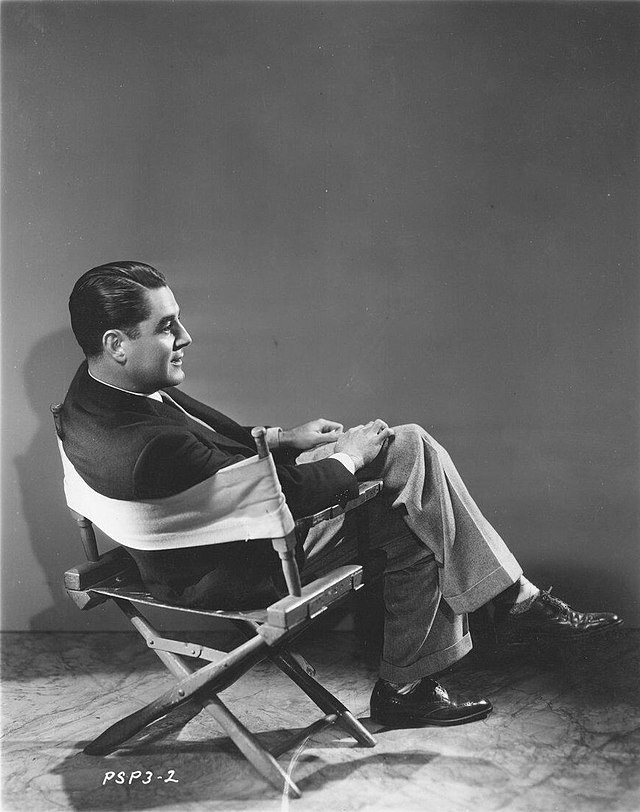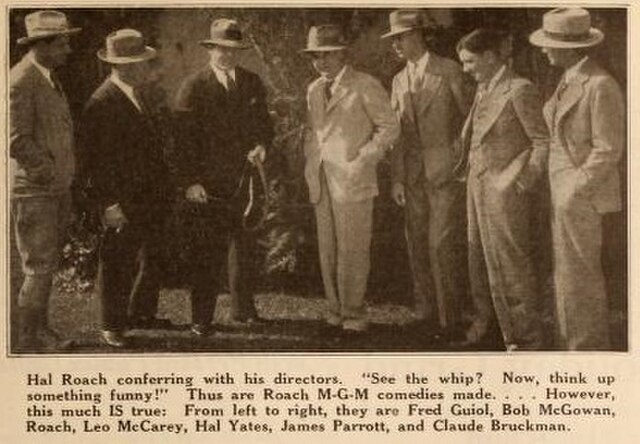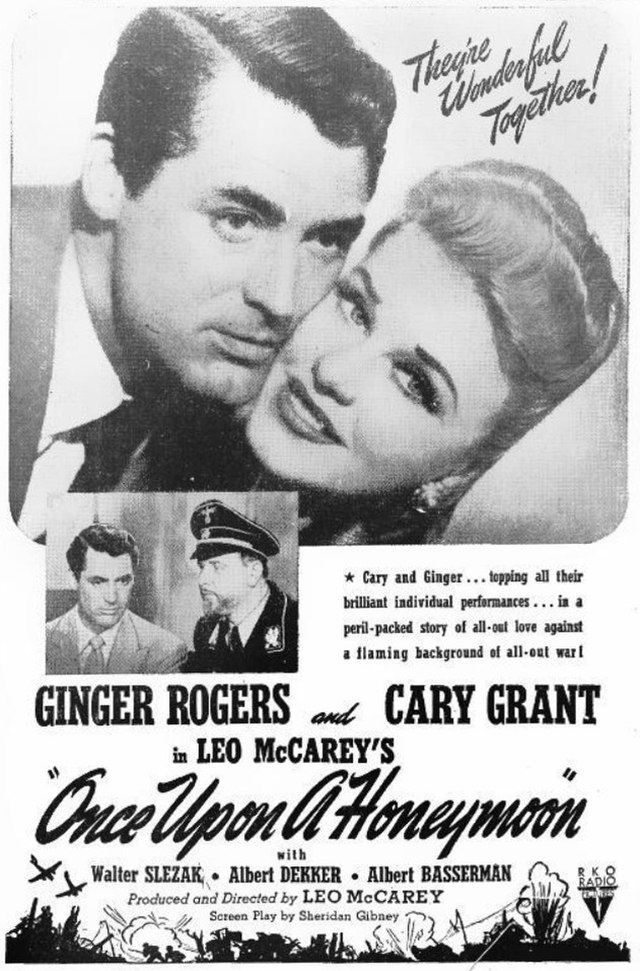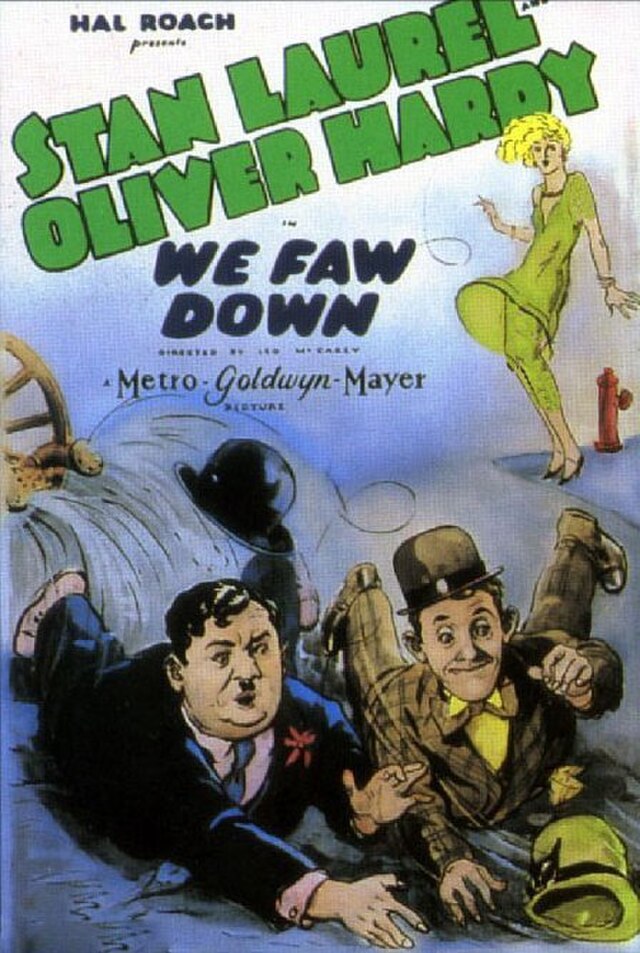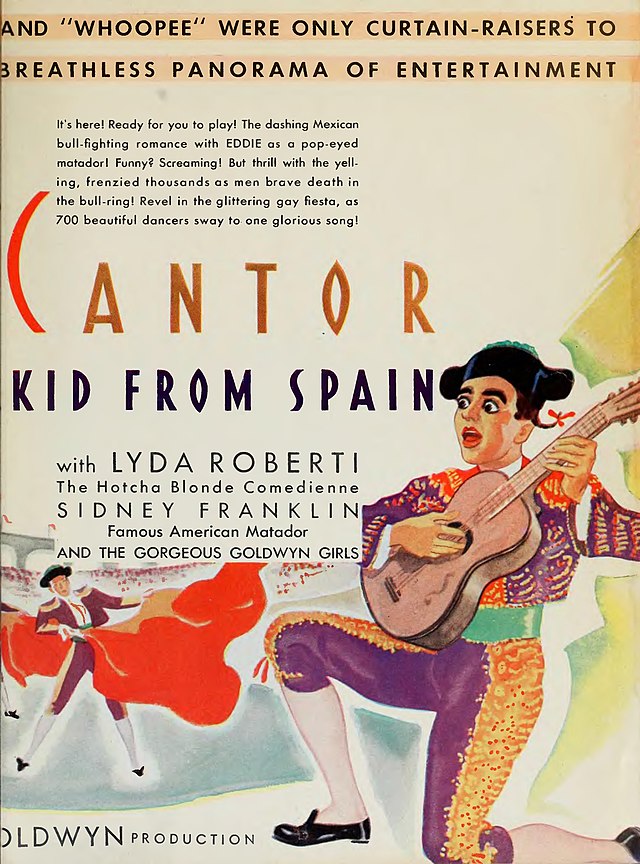Leo McCarey
back| Full Name | Thomas Leo McCarey |
| Born | October 3, 1898 |
| Birthplace | Los Angeles, California, USA |
| Died | July 5, 1969 |
| Buried | Holy Cross Cemetery, Culver City, California, USA |
| Married to | Stella Martin McCarey (married in 1920) |
| Children | Mary McCarey |
| Notable films | Duck Soup (1933) - Make Way for Tomorrow (1937) - The Awful Truth (1937) - The Bells of St. Mary's (1945) - An Affair to Remember (1957) |
Leo McCarey
The Humanist of Hollywood
Leo McCarey (1898–1969) was an influential American film director known for his blend of comedy, sentimentality, and human insight. Beginning his career in silent comedies at Hal Roach Studios, he helped shape Laurel and Hardy's partnership and directed the Marx Brothers' classic Duck Soup (1933).
McCarey's versatility shone in romantic comedies like The Awful Truth (1937), for which he won his first Academy Award for Best Director. His later work, including Going My Way (1944) and The Bells of St. Mary's (1945), explored themes of faith and community, earning him a second Best Director Oscar.
Related
Leo McCarey
Biography and Movie Career
Leo McCarey, born Thomas Leo McCarey on October 3, 1898, in Los Angeles, California, was one of Hollywood's most influential directors, celebrated for his versatility in both comedy and drama. Growing up in Southern California, McCarey was initially expected to follow in his father’s footsteps and pursue a career in law. He graduated from the University of Southern California’s law school, but his passion for the arts led him to a different path—Hollywood.
Early Life and Start in Hollywood
McCarey entered the film industry during its early days, working his way up from the bottom. He began as an assistant director and gag writer for the Hal Roach Studios, which specialized in producing comedy shorts. This environment allowed McCarey to hone his comedic sensibilities and gave him the opportunity to work with comedic legends like Laurel and Hardy. In fact, many credit McCarey with helping to establish the duo’s successful on-screen dynamic. His ability to blend humor with heartfelt sentiment became a signature that would define his career.
Breakthrough with Comedy and the Marx Brothers
One of McCarey’s first major directorial successes came with Duck Soup (1933), starring the Marx Brothers. The film is now considered one of the greatest comedies ever made, although it initially faced mixed reception. Duck Soup showcased McCarey’s knack for blending anarchic, slapstick humor with sharp social and political satire. His partnership with the Marx Brothers highlighted his skill at managing comedic ensembles and allowing improvisation to thrive within the bounds of structure.
Transition to Romantic Comedy and Drama
In the mid-1930s, McCarey transitioned from slapstick comedy to romantic comedies and dramas. One of his most significant early successes in this genre was The Awful Truth (1937), starring Cary Grant and Irene Dunne. The film, known for its witty dialogue and sophisticated humor, won McCarey the Academy Award for Best Director. The Awful Truth cemented McCarey’s reputation as a master of romantic comedies, but it also displayed his deeper understanding of human emotions and relationships. His films began to focus more on character development and the emotional complexities of love, friendship, and family.
Make Way for Tomorrow – An Overlooked Gem
While McCarey is often remembered for his comedies, one of his most personal and touching films was Make Way for Tomorrow (1937), released the same year as The Awful Truth. This melancholic drama tells the story of an elderly couple forced to separate when their children can no longer afford to care for them. Though it did not achieve box office success at the time, the film has since been regarded as a masterpiece of humanistic cinema. It is widely believed that this film, which explored themes of aging, family obligation, and loss, was one of McCarey’s personal favorites, even though it was largely overlooked during his lifetime.
Religious Themes and the War Years
In the 1940s, McCarey further expanded his range by incorporating his Catholic faith into his work. His 1944 film Going My Way, starring Bing Crosby as a warm-hearted priest, was a massive success and earned McCarey his second Academy Award for Best Director. The film also won the Academy Award for Best Picture. Its sequel, The Bells of St. Mary’s (1945), continued in the same vein, pairing Crosby with Ingrid Bergman as a nun. Both films showcased McCarey’s skill at blending spirituality, humor, and sentimentality in ways that deeply resonated with audiences.
Later Career and An Affair to Remember
In the 1950s, McCarey returned to romantic dramas, directing what would become one of his most iconic films, An Affair to Remember (1957). Starring Cary Grant and Deborah Kerr, the film is a remake of McCarey’s earlier film Love Affair (1939) and is considered a classic love story, widely remembered for its tragic, emotional depth.
However, by the late 1950s and early 1960s, McCarey’s influence in Hollywood began to wane. The changing landscape of the film industry, along with health problems, meant that his output slowed significantly during his later years.
Personal Life
Leo McCarey was married to Stella Martin McCarey, with whom he had one daughter, Mary McCarey. His marriage remained strong throughout his life, and Stella was a constant companion through both his professional highs and personal challenges. While McCarey was known for the lightness of his films, his personal life was not without difficulty. He struggled with health issues later in life, particularly related to his battle with alcoholism, a challenge he overcame in his later years. McCarey’s Catholic faith played an important role in his personal and professional life, influencing many of his films’ themes.
Legacy and Death
Leo McCarey passed away on July 5, 1969, at the age of 70, in Santa Monica, California. He was buried at Holy Cross Cemetery in Culver City, California. His legacy remains strong, particularly among directors and film historians who appreciate his wide-ranging influence on the art of filmmaking. McCarey was unique in his ability to master multiple genres, from slapstick comedy to romantic drama, and his films continue to be celebrated for their blend of humor, heart, and humanity.
Today, McCarey is remembered not only for his contribution to the development of Hollywood comedy but also for his profound insights into human relationships, whether through the laughs of Duck Soup or the poignant sadness of Make Way for Tomorrow. His work laid the groundwork for many modern directors, who continue to be influenced by his distinct combination of warmth, sentimentality, and humor.
Video Documentary on Leo McCarey
Distinctive Directing Style from Leo McCarey
Leo McCarey’s directing style is one of the most distinctive and versatile in Hollywood’s Golden Age, blending elements of comedy, sentimentality, and deep human insight. His films often move effortlessly between lighthearted humor and emotional depth, with a focus on human relationships, emotions, and spirituality. Here are the key aspects of McCarey’s directing style:
Blending Comedy with Sentimentality
McCarey’s early career at Hal Roach Studios—working with comedic legends like Laurel and Hardy—honed his ability to create visually-driven, physical comedy. He had an innate sense of timing, both for gags and dialogue, which made his comedies feel organic and natural. What set McCarey apart was his ability to inject heartfelt sentiment into even his most humorous films.
- Example: The Awful Truth (1937) is a screwball comedy filled with witty repartee and physical comedy, but it also delves into themes of love, trust, and reconciliation. McCarey masterfully balances the absurdity of the situations with genuine emotional stakes.
This combination of light and serious elements gave his films a unique emotional richness. Audiences could laugh at the clever comedy but also feel deeply connected to the characters' emotional journeys.
Improvisation and Organic Performances
McCarey was known for his use of improvisation, allowing actors the freedom to experiment with their roles. He believed that genuine emotions came from spontaneity, and he encouraged actors to deviate from the script when they felt it would enhance the scene. This created a sense of authenticity in his films.
- Example: In The Awful Truth, Cary Grant and Irene Dunne’s chemistry and banter are largely a result of McCarey allowing them to play off each other. Many of their best moments, such as Grant’s famous pratfalls and facial expressions, were improvised.
McCarey’s trust in his actors and improvisation allowed for performances that felt fresh and dynamic, giving his films a sense of immediacy.
Humanistic Themes and Emotional Depth
McCarey had a deep understanding of human nature, which was evident in the way he portrayed relationships. His films often revolve around complex interpersonal dynamics, focusing on love, family, forgiveness, and personal growth. He portrayed characters with flaws, allowing for more nuanced and realistic storytelling.
- Example: Make Way for Tomorrow (1937) is a touching drama about an elderly couple facing separation due to financial hardship. The film’s emotional realism and lack of a traditionally happy ending make it a poignant meditation on aging and familial responsibility. It is one of the few films from that era to focus so directly on the struggles of the elderly.
McCarey’s ability to tap into the emotional core of his characters and stories made his films resonate on a deeply human level, even when framed within the context of broader comedies or dramas.
Religious and Spiritual Elements
McCarey’s Catholic faith played an important role in shaping the moral and spiritual themes in his work. His films often depict characters who undergo moral or spiritual transformations, sometimes through religious figures like priests or nuns. His later films, particularly those in the 1940s, were influenced by his religious beliefs, as he explored themes of faith, redemption, and community.
- Example: Going My Way (1944) and The Bells of St. Mary’s (1945) focus on the role of religion in daily life, particularly in how Father O’Malley (Bing Crosby) inspires a sense of moral goodness and community through his unorthodox methods. These films combine humor and sentimentality with messages about faith, kindness, and redemption.
Mastery of Romantic Drama
While McCarey is often remembered for his contributions to comedy, he was equally adept at directing romantic dramas, which he often infused with a deep sense of longing, loss, and emotional complexity. He frequently used the concept of delayed or thwarted love, which heightened the emotional impact of his films.
- Example: An Affair to Remember (1957) is one of the most iconic romantic dramas of all time, largely due to McCarey’s ability to blend romantic yearning with the dramatic obstacles that keep the lovers apart. He uses quiet, emotionally charged moments—like the famous Empire State Building scene—to create intense emotional connections between the characters and the audience.
Influence of Silent Film Techniques
McCarey started his career in the silent film era, and his understanding of visual storytelling carried over into his sound films. Even when working with dialogue-heavy comedies, McCarey maintained a strong sense of visual rhythm and timing. His films often feature scenes where the physical actions of characters speak louder than their words.
- Example: In Duck Soup (1933), McCarey’s work with the Marx Brothers showcases his ability to create fast-paced, chaotic visual comedy. The mirror scene, in particular, is a brilliant use of silent film techniques within a sound picture.
Exploration of Social and Political Themes
Although McCarey’s work is generally remembered for its emotional and spiritual depth, he occasionally touched on political and social themes, particularly in films like Duck Soup, which satirizes the absurdity of war and political leadership.
- Example: Duck Soup (1933) critiques nationalism and war through absurd humor, with McCarey using the Marx Brothers’ anarchic style to mock the concept of government and international relations. This film, though comedic, has been interpreted as a subversive statement on the dangers of authoritarianism and conflict.
Personal Quotes from Leo McCarey
On Filmmaking and Comedy:
- "You can really do more with a smile than with a frown."
McCarey believed that humor and positivity had the power to connect with audiences more deeply than pessimism or darkness. - "I don’t know what my formula is, but I know I have one."
This self-aware statement reflects McCarey's humility and the difficulty in pinpointing exactly what made his films work so well, even though he clearly had a winning approach. - "I find myself more interested in the human side of things, rather than the mechanical side of moviemaking."
McCarey emphasized character development, relationships, and emotions over technical wizardry, making him a director known for deep emotional storytelling. - "When I had the Marx Brothers, I was a director. All I had to do was say, 'Action,' and stay out of the way."
Reflecting on his work with the anarchic Marx Brothers, McCarey acknowledged the chaotic, freewheeling energy they brought, showing his humility and respect for their comedic genius.
On Make Way for Tomorrow (1937):
- "I’ve been asked to remake Make Way for Tomorrow but I said, 'No, let someone else remake Gone with the Wind, but not Make Way for Tomorrow.'"
This quote reveals how personal the film Make Way for Tomorrow was to McCarey. The film, which he often called his favorite, was deeply meaningful to him despite its lack of commercial success.
On Sentimentality:
- "People think of me as sentimental. I am, but I also have a very deep streak of cynicism."
McCarey’s films, especially those blending comedy and drama, often showcased his ability to balance sentimentality with realism and occasionally cynical observations about life.
On the Film Industry:
- "It’s not the job of a director to entertain. It’s his job to tell the truth, to get at the truth. If he gets the truth, he will entertain."
This philosophy guided McCarey’s filmmaking, emphasizing honesty and authenticity in storytelling over shallow entertainment.
Awards and Recognition
Leo McCarey enjoyed a successful career as a film director, receiving numerous awards and nominations for his work, particularly during the 1930s and 1940s.
Academy Awards
- Wins:
- Best Director: The Awful Truth (1937) – This screwball comedy, starring Cary Grant and Irene Dunne, won McCarey his first Academy Award for Best Director. The film is regarded as one of the finest romantic comedies of its era.
- Best Director: Going My Way (1944) – McCarey earned his second Best Director Oscar for this heartwarming film about a young priest. The movie also won the Academy Award for Best Picture.
- Best Original Story: Going My Way (1944) – In addition to directing, McCarey received an Oscar for his original story for Going My Way.
- Nominations:
- Best Picture: The Awful Truth (1937) – Nominated for Best Picture, the film was an all-around success both critically and commercially.
- Best Director: The Bells of St. Mary's (1945) – McCarey was nominated for Best Director again for this sequel to Going My Way, which starred Bing Crosby and Ingrid Bergman.
- Best Picture: The Bells of St. Mary's (1945) – The film was also nominated for Best Picture.
- Best Screenplay: Love Affair (1939) – McCarey was nominated for Best Screenplay for this romantic drama, which he later remade as An Affair to Remember (1957).
- Best Original Screenplay: The Bells of St. Mary's (1945) – Nominated for his screenplay work on this follow-up to Going My Way.
- Best Original Story: The Bells of St. Mary's (1945) – Another nomination for his story contribution.
Golden Globe Awards
- Wins:
- Best Director: Going My Way (1944) – McCarey won the Golden Globe for Best Director for Going My Way, further cementing the film's success and popularity.
- Nominations:
- Best Director: The Bells of St. Mary’s (1945) – McCarey was nominated for a Golden Globe for directing this beloved follow-up to Going My Way.
Venice Film Festival
- Wins:
- Best Director: The Awful Truth (1937) – McCarey was awarded Best Director at the Venice Film Festival for The Awful Truth, adding international recognition to his growing list of accolades.
National Board of Review
- Wins:
- Best Director: Going My Way (1944) – The National Board of Review named McCarey the Best Director for his work on Going My Way.
Directors Guild of America (DGA) Awards
- Nominations:
- Outstanding Directorial Achievement: An Affair to Remember (1957) – McCarey received a DGA nomination for his direction of An Affair to Remember, which had become a beloved classic over time.
New York Film Critics Circle Awards
- Wins:
- Best Director: Going My Way (1944) – McCarey was named Best Director by the New York Film Critics Circle for Going My Way.
Other Recognitions
- Box Office Blue Ribbon Award (1945) – McCarey’s films Going My Way and The Bells of St. Mary's both won the Blue Ribbon Award for their outstanding box office performances.
- National Film Registry Induction:
- Duck Soup (1933), The Awful Truth (1937), Going My Way (1944), and Make Way for Tomorrow (1937) have all been selected for preservation in the National Film Registry by the Library of Congress for being "culturally, historically, or aesthetically significant."
Notable Absences
Despite McCarey’s contributions to American cinema, many of his works, such as Make Way for Tomorrow (1937), went unrecognized by major award bodies during their time. However, they have since been reappraised and are now considered masterpieces, demonstrating how his influence was sometimes underappreciated in the moment but has grown in stature over time.
Summary of Major Awards:
- Academy Awards:
- 3 Wins (2 for Best Director, 1 for Best Original Story)
- 8 Nominations (including Best Picture and Best Director)
- Golden Globe Awards:
- 1 Win (Best Director for Going My Way)
- 1 Nomination (Best Director for The Bells of St. Mary’s)
- Venice Film Festival:
- 1 Win (Best Director for The Awful Truth)
Leo McCarey’s contributions to cinema have been recognized by some of the highest honors in the industry, particularly for his work during the 1930s and 1940s. His legacy as a versatile and deeply humanistic filmmaker is reflected in these numerous awards and accolades.
Movies Directed by Leo McCarey
1921-1928 (Shorts and Early Comedies)
- 1921–1929 (various shorts) – Leo McCarey began his career directing numerous short comedy films, particularly with Hal Roach Studios, often working with Laurel and Hardy. These early shorts helped him develop his skill in comedic timing.
1929
- Red Hot Rhythm (1929) – A musical comedy about a bandleader and the love triangle that forms between him, his assistant, and a debutante.
1930
- Wild Company (1930) – A melodrama about a wealthy young man who becomes involved with a nightclub singer, leading to family conflicts.
- Part Time Wife (1930) – A light-hearted comedy about a man who takes a job as a caddy to win back his golf-loving wife.
1931
- Let’s Go Native (1931) – A comedy about a fashion designer, a taxi driver, and a group of beauty pageant contestants who find themselves shipwrecked on a tropical island.
- Indiscreet (1931) – A romantic comedy about a woman who tries to avoid falling in love but becomes involved in a complicated romantic entanglement.
1932
- The Kid from Spain (1932) – A musical comedy starring Eddie Cantor as a young American who gets involved in bullfighting to escape trouble.
1933
- Duck Soup (1933) – A satirical political comedy starring the Marx Brothers. The story revolves around the fictitious country of Freedonia and its war with a neighboring nation. The film is now regarded as one of the greatest comedies of all time.
1935
- Belle of the Nineties (1935) – A musical comedy starring Mae West as a singer who navigates romance and fame in the 1890s.
1937
- Make Way for Tomorrow (1937) – A deeply moving drama about an elderly couple who are forced to live apart when their children cannot take care of them. It’s considered one of McCarey’s most poignant works and a significant influence on later filmmakers.
- The Awful Truth (1937) – A romantic comedy about a couple (played by Cary Grant and Irene Dunne) who are in the process of divorcing but realize they are still in love. This film earned McCarey an Academy Award for Best Director.
1938
- Love Affair (1939) – A romantic drama about two people who fall in love aboard an ocean liner and agree to meet at the Empire State Building six months later. The film was remade by McCarey in 1957 as An Affair to Remember.
1940
- My Favorite Wife (1940) – A romantic screwball comedy about a woman who is presumed dead after a shipwreck but returns years later to find her husband remarried. It was another successful collaboration with Cary Grant and Irene Dunne.
1941
- Once Upon a Honeymoon (1942) – A romantic comedy set during World War II, following a woman who marries a Nazi spy but is saved by an American radio reporter.
1944
- Going My Way (1944) – A heartwarming film about a young, unconventional priest (played by Bing Crosby) who is sent to rejuvenate a struggling parish. The film won seven Academy Awards, including Best Picture and Best Director for McCarey.
1945
- The Bells of St. Mary's (1945) – A sequel to Going My Way, this time focusing on Bing Crosby’s Father O’Malley as he helps a financially troubled parochial school run by Sister Mary Benedict (Ingrid Bergman). The film was both commercially and critically successful.
1948
- Good Sam (1948) – A comedy-drama about a man who constantly helps others, often to the detriment of his own well-being, causing tension in his personal life.
1952
- My Son John (1952) – A Cold War-era drama about a mother who discovers that her beloved son is a communist spy. The film reflects McCarey’s strong anti-communist sentiments during this period.
1957
- An Affair to Remember (1957) – A remake of McCarey’s earlier film Love Affair, this romantic drama stars Cary Grant and Deborah Kerr as a couple who fall in love but face obstacles before they can be together. The film is regarded as one of the most beloved romantic films of all time.
1962
- Satan Never Sleeps (1962) – A war drama about two Catholic missionaries in China who struggle to maintain their faith and mission during the Communist takeover. This was McCarey’s last film and reflected his ongoing religious and political concerns.

